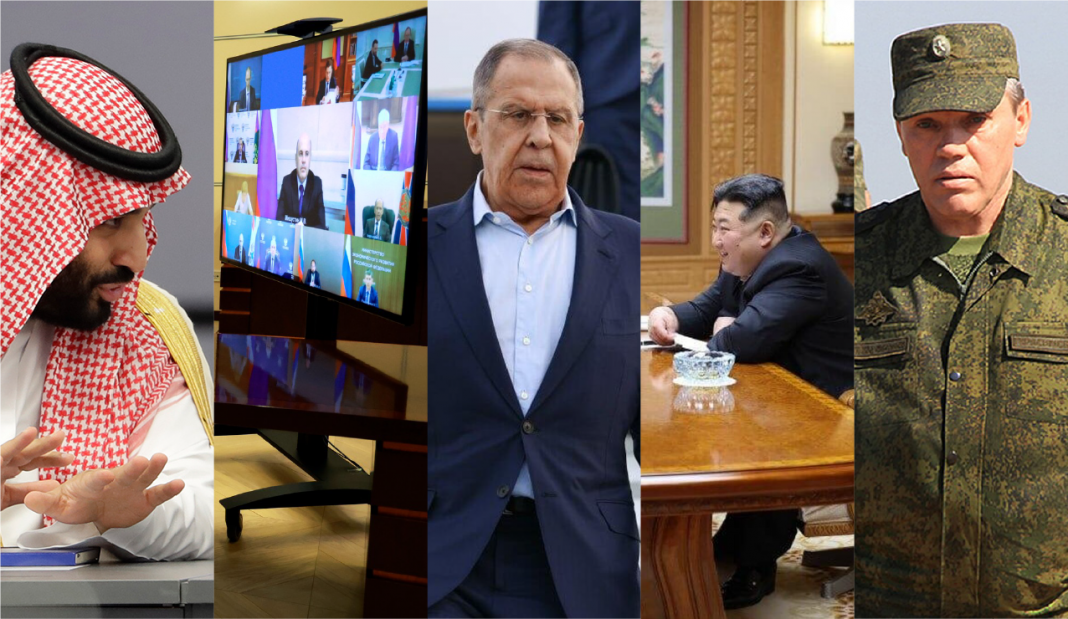This report presents key events that had an important impact on political, economic and social processes within Russia.
According to the results of the past week the following trends can be defined in the following thesis:
- As predicted earlier, the sanctions against Russia still have their negative consequences for the country’s economy, and the bravado “sanctions are not terrible for us” does not work today – the reality still forces the Russian leadership to take steps aimed at preempting crisis phenomena in the economy and in the financial sphere.
- According to reports from the Federal Security Service (FSB), a series of terrorist acts may take place in Russia in the near future, which, according to Russian security forces, may be organized by members of extremist Islamic organizations of the Wahhabi persuasion. Moreover, the FSB is trying to draw a line between the Wahhabis – Ukrainian military intelligence – Western intelligence services. Therefore, the security agencies in Russia are already working proactively and have been put on full readiness to repel possible threats.
- In fact, we can now observe a collective attempt to return to the agenda that was taking shape at the end of 2021, but was never agreed upon during the series of negotiations in January 2022. Undoubtedly, a number of current events are forcing a change in some positions and approaches, but the thesis of the need to form a new world order is becoming louder and more concrete, both in the West, the East or the Global South.
This digest looks at the following issues that were most relevant to Russia between the 15th and 21st of July:
- Economic Affairs Meeting;
- Vladimir Putin’s telephone conversation with Saudi Crown Prince Mohammed bin Salman Al Saud;
- Meeting with the permanent members of the Security Council;
- Sergey Lavrov’s visit to the United States;
- Valery Gerasimov’s visit to the temporarily occupied territories of Ukraine;
- Visit of a delegation from the Russian Ministry of Defence to North Korea.
This Content Is Only For Subscribers
- Meeting on economic issues
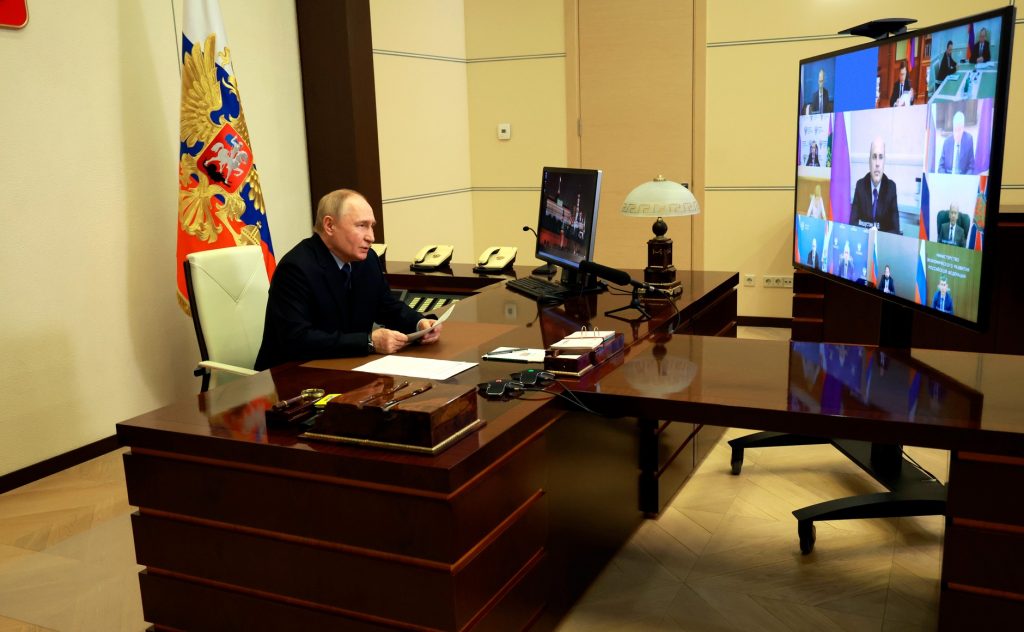
On Wednesday, 17 July, Vladimir Putin held a meeting on economic issues via videoconference. According to official statements, the meeting discussed the development of digital technologies in the financial sector.
The meeting was attended by Prime Minister Mikhail Mishustin, Head of the Presidential Administration Anton Vaino, Deputy Prime Minister – Head of the Government Staff Dmitry Grigorenko, Deputy Prime Minister Alexander Novak, Assistant to the President Maxim Oreshkin, Assistant to the President – Head of the State Legal Department Larisa Brycheva, Minister of Economic Development Maxim Reshetnikov, Minister of Finance Anton Siluanov, Minister of Energy Sergei Tsivilev, Minister of Digital Development, Communications and Mass Media Maksut Shadaev, Director of the Federal Security Service Alexander Bortnikov, Director of the Federal Financial Monitoring Service Yuri Chikhanchin, Head of the Federal Antimonopoly Service Maxim Shaskolsky.
Key points from Putin’s opening speech:
- “Today I propose to discuss issues related to the development of digital technologies in the financial sector, and more specifically, the introduction and use of digital currencies and other assets.”
- “It is important for us in Russia, as they call it, not to miss the moment, to set up the legal framework and regulation in a timely manner, to develop infrastructure, and to create conditions for the circulation of digital assets, both domestically and in relations with foreign partners.”
- “I will start with the pilot project that was launched by the Central Bank last August. We are talking about a test, trial use of the digital ruble. In essence, it is another form of our national monetary unit. Its peculiarity is that citizens and businesses can use the digital ruble regardless of which bank they have an account with.
- “The project involves 12 banks, 600 individuals and 22 trade and service enterprises from 11 cities. As of the first of July, more than 27,000 transfers and over seven thousand payments for goods and services have already been made in this system. In short, the digital rouble platform has demonstrated its efficiency and functionality within the framework of the ‘pilot'”.
- “Now we need to take the next step, which is to move to a broader, full-scale introduction of the digital rouble into the economy, into business activities and into finance. I expect that today we will talk about this topic in detail.”
- “And a separate issue concerns the so-called cryptocurrencies. They are not monetary units in the usual sense, but they are increasingly being used around the world as a means of payment in international settlements.”
- “In turn, mining, or so-called mining, of digital currencies can be done virtually anywhere on the planet. But this requires a lot of electricity. According to estimates by the Ministry of Energy, 16 billion kilowatt-hours are spent annually for this purpose in Russia, that is, almost one and a half per cent of the country’s total electricity consumption. And the figure continues to grow.
- “But what should attract our attention here and what is alarming here? Uncontrolled growth in electricity consumption for cryptocurrency mining can lead to power shortages in certain regions. And this has already been noted in the Irkutsk region, Buryatia, and the Trans-Baikal Territory. The issue is actually acute and fraught with serious consequences for enterprises, housing and utilities systems, and specific cities and towns. Colleagues from the regions are speaking directly about their concerns in this regard.
Totals/Predictions:
The main topic of the meeting was opportunities for Russian banks and Russian entrepreneurs under sanctions, the operation of the Mir payment system (expansion of opportunities), the negotiation process with countries of the Global South on mutual financial transactions and system reliability. Also discussed were the digital ruble and cryptocurrencies, which can also partially help circumvent sanctions pressure.
As predicted earlier, the sanctions against Russia still have their negative consequences for the country’s economy, and the bravado “sanctions are not terrible for us” does not work today – the reality still forces the Russian leadership to take steps aimed at preempting crisis phenomena in the economy and in the financial sphere.
Moreover, in the long term, the energy problem in Russia is becoming more acute. It is already becoming clear that the process of de facto transfer of the economy to the military has led to a shortage of electricity, which is intensified, among other things, through regular shelling of the energy infrastructure in the regions bordering Ukraine. Undoubtedly, this factor requires an immediate response.
- Telephone conversation between Vladimir Putin and Crown Prince Mohammed bin Salman Al Saud of Saudi Arabia
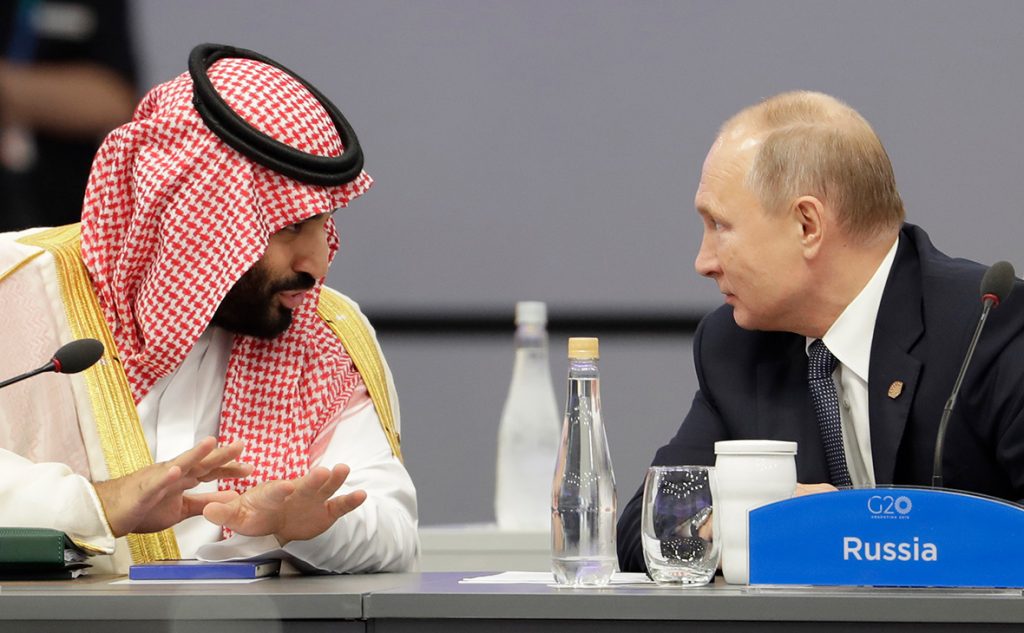
On Wednesday, 17 July, at the initiative of the Russian side, Vladimir Putin held a telephone conversation with Crown Prince Mohammed bin Salman Al Saud, Chairman of the Council of Ministers of Saudi Arabia.
It is noteworthy that following the talks, both sides published rather dry press releases, which did not specify any specifics about the occasion or the main results of the dialogue. At the same time, it is noted that both sides praised the achieved level of friendly relations between Russia and Saudi Arabia, which are based on the principles of mutual respect and consideration of each other’s interests. The sides also touched upon a number of topical issues of Russian-Saudi co-operation in the political, trade, economic and energy spheres.
Totals/Predictions:
The main topic of conversation concerns the position of the parties regarding policies aimed at reducing oil production and increasing oil prices globally. Recently, Saudi Arabia has begun to question the advisability of curbing its own hydrocarbon production capacity – not without assistance from the US and the UK, which are keenly interested in lowering the price of oil products. Russia and China have over the past six years taken the lead from the US in terms of co-operation with Riyadh, but the Saudis are rather capricious and unpredictable as partners. Obviously, Russia would also like to secure guarantees on other issues: peace in the Middle East, coordination of actions regarding Israel, peace with Iran, and others.
- Meeting with the permanent members of the Security Council
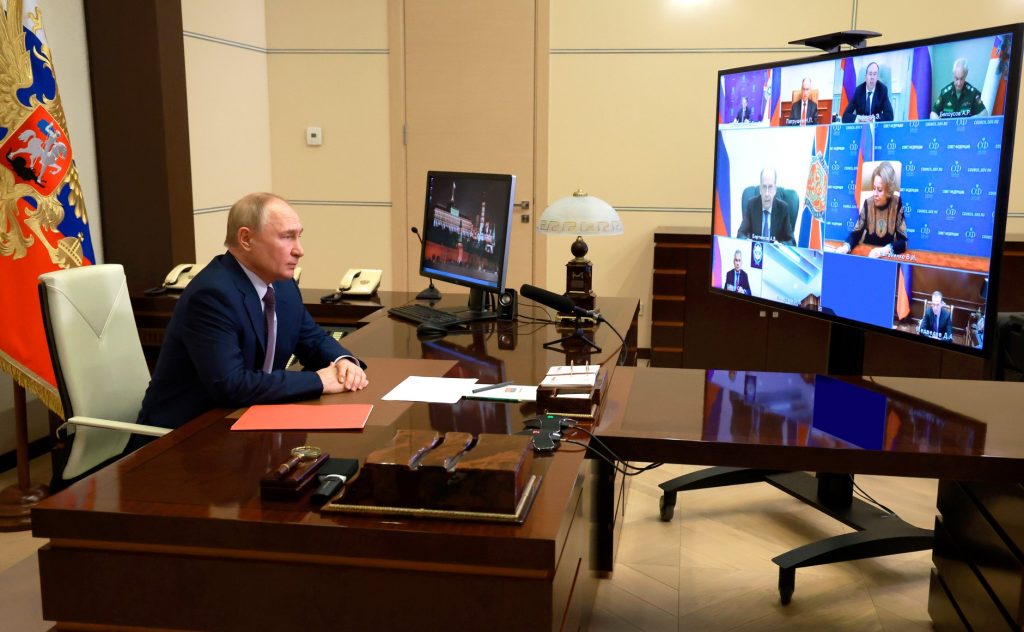
On Friday, 19 July, Vladimir Putin held a meeting with permanent members of the Security Council via videoconference. The main topic of discussion was issues related to ensuring internal security during significant social and political events. At the same time, no specifics about any events or developments were mentioned. Alexander Bortnikov, Director of the Federal Security Service, presented a report on the subject of the meeting.
It is noteworthy that the meeting itself was held in a rather narrow format compared to other similar meetings. It was attended by Prime Minister Mikhail Mishustin, Federation Council Chairman Valentina Matvienko, Security Council Deputy Chairman Dmitry Medvedev, Head of the Presidential Administration Anton Vaino, Security Council Secretary Sergei Shoigu, Defence Minister Andrei Belousov, Foreign Intelligence Service Director Sergei Naryshkin, and Presidential Aide Nikolai Patrushev.
Totals/Predictions:
According to reports from the Federal Security Service (FSB), a series of terrorist acts may take place in Russia in the near future, which, according to Russian security forces, may be organized by members of extremist Islamic organizations of the Wahhabi persuasion. Moreover, the FSB is trying to draw a line between the Wahhabis – Ukrainian military intelligence – Western intelligence services. Therefore, the security agencies in Russia are already working proactively and have been put on full readiness to repel possible threats.
It is quite remarkable that preparations for such provocations are taking place against the background of intensifying negotiations on a possible cessation of hostilities in Ukraine, as well as the revision of a number of geopolitical aspects. It is not excluded that this is how the notional “black swans” will be created, whose main task will be to create new reasons for further escalation in the international arena.
- Sergey Lavrov’s visit to the USA
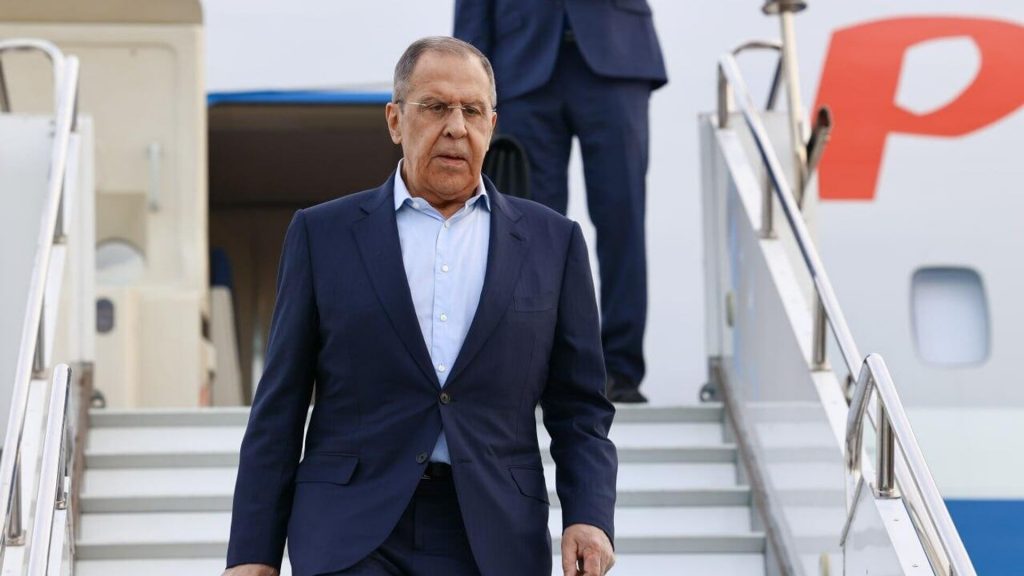
On Tuesday, 16 July, Russian Foreign Minister Sergey Lavrov flew to New York to attend a meeting of the UN Security Council. The visit took place within the framework of Moscow’s presidency of the UNSC.
Lavrov had several bilateral meetings scheduled in New York. It is noted that during the contacts, the minister will discuss with his counterparts topical issues on the international and regional agenda, including the Middle East and the situation in Gaza, the situation in Ukraine and efforts to defend the UN Charter.
Lavrov also took part in an open debate on multilateral co-operation for a more just, democratic and sustainable world order. On Wednesday, 17 July, the Russian Foreign Minister took part in a meeting of the UN Security Council on the situation in the Middle East, where, in particular, the Palestinian issue was discussed.
Key messages from Sergey Lavrov’s speech during the UN Security Council meeting on multilateral co-operation for a more just, democratic and sustainable world order:
- “Today, the very foundations of the international legal order – strategic stability and the UN-centred system of world politics – are being put to the test. The very foundations of the international rule of law – strategic stability and the UN-centred system of world politics – are being tested today unless we understand the root causes and restore faith in our ability to join forces for the common good and justice for all.
- “Let us be frank: not all the states represented in this room recognise the key principle of the UN Charter: the sovereign equality of all states. The United States has long declared its own exceptionalism through its presidents. This applies to Washington’s attitude towards its allies, from whom it demands unquestioning obedience, even to the detriment of their national interests”.
- “The most important components of international law – the UN Charter and the decisions of our Council – are interpreted by the “collective West” in a perverse and selective manner, depending on what instructions come from the White House. And many Security Council resolutions are ignored altogether. Among them are resolution 2202, which approved the Minsk agreements on Ukraine, and resolution 1031, which approved the Dayton Agreement on peace in BiH on the basis of the principle of equal rights for the three constituent peoples and two entities. One can talk endlessly about sabotage of resolutions on the Middle East – what is worth Anthony Blinken’s statement in an interview with CNN in February 2021 in response to a question about what he thinks about the decision of the previous US administration to recognise the Syrian Golan Heights as belonging to Israel. In case anyone doesn’t remember, I’ll refresh your memory. In response to this question, the Secretary of State said: “Leaving aside the question of legality, from a practical point of view, the Golan is very important to Israel’s security.”
- “It is indicative that even now, when numerous initiatives on the Ukrainian settlement are being put forward, few people remember Kiev’s violation of human rights and national minorities. Only recently, the EU documents on the start of negotiations on Ukraine’s accession formulated a corresponding demand, mainly due to the principled and persistent position of Hungary. However, the real possibilities and desire of Brussels to influence the Kiev regime are questionable”.
- “The North Atlantic Alliance has had enough of the war it has unleashed against Russia at the hands of the illegitimate authorities in Kyiv, and it has had enough of the entire OSCE area. Having destroyed almost to the ground the fundamental agreements on arms control, the United States continues to escalate the confrontation. Recently, at a summit in Washington, D.C., the leaders of the alliance countries reaffirmed their claims to a leading role not only in the Euro-Atlantic but also in the Asia-Pacific region. It is declared that NATO is still guided by the task of defending the territory of its members, but for this purpose, it is necessary to extend the alliance’s dominance to the entire Eurasian continent and adjacent sea areas. NATO’s military infrastructure is moving into the Pacific with the obvious aim of undermining the ASEAN-centric architecture, which for many decades has been built on the principles of equality, consideration of mutual interests and consensus”.
- “Where are all those attributes of the free market, which the United States and its allies have been teaching everyone for so many years? Market economy, fair competition, inviolability of property, presumption of innocence, freedom of movement of people, goods, capital and services – today all of this has been scrapped. Geopolitics has buried the once sacred laws of the market for the West. Recently, we have heard public demands from US and EU officials for China to reduce “overproduction” in high-tech industries, as the West has begun to lose its long-standing advantages in these sectors as well. Now, instead of market principles, it is the very same ‘rules'”.
- “The BRICS and the Shanghai Cooperation Organisation are playing an increasingly important role in building a just multilateral order based on the principles of the UN Charter. They bring together countries representing different regions and civilisations, cooperating on the basis of equality, mutual respect, consensus and mutually acceptable compromises – the ‘gold standard’ of multilateral interaction involving the great powers”.
- “Regional associations such as the CIS, CSTO, EAEU, ASEAN, GCC, LAS, African Union and CELAC are of practical importance for the establishment of multipolarity. We see it as an important task to establish multifaceted links between them, including by involving the potential of the United Nations. The Russian Chairmanship of the Council will devote one of its next meetings to UN interaction with Eurasian regional organisations.
Following his first day in the United States, Sergey Lavrov gave a short commentary for the Russian media, in which he described his first impressions of his participation in the meeting and the bilateral meetings held.
Key Abstracts:
- “The talks with each of the ministers were devoted to bilateral affairs. With Swiss Foreign Minister Cassis, out of the international topics, we mainly talked about the Ukrainian settlement. He explained that the conference in Bürgenstock was not directed against Russia, but was intended to prepare the ground for real negotiations, taking into account the interests of all parties”.
- “Representatives of Western states have once again signed themselves in contempt of the main principle of the UN Charter, which establishes that the World Organisation is based on the sovereign equality of states. What they are doing is aimed solely at subordinating everything, including the UN itself, to their own selfish interests”.
Key points from Sergey Lavrov’s speech during the open meeting of the UN Security Council:
- “The Middle East region faces unprecedented risks to the security, well-being and peaceful lives of its peoples. Waves of violence are spilling far beyond the Arab-Israeli conflict zone, destabilising the Persian Gulf, the Red Sea, the Mediterranean Sea and northern Africa. We need a frank and honest conversation about how to stop the bloodshed and civilian suffering without delay and move towards a long-term solution to both long-standing and relatively new conflicts”.
- “We attach particular importance to dialogue with the Arab countries and their neighbours, Iran and Turkey. From the outset, we have appreciated the constructive potential of the Arab Peace Initiative launched by Saudi Arabia in 2002. At the same time, we respected the decision of a number of Arab states to normalise relations with Israel even before the Palestinian issue was resolved. They advocated the inclusion of pan-Arab and Islamic organisations – the LAS and the OIC – in the collective efforts of the Quartet of international mediators, which, unfortunately, was ‘buried’ under the ruins of the American ‘deal of the century'”.
- “Today, the most acute and urgent problem is the Palestinian problem. The UN Security Council is meeting at the ministerial level for the fourth time in 10 months. Four resolutions have been adopted. However, the ongoing bloodshed in the occupied Palestinian territories confirms that all these decisions remain “on paper”. Russia has consistently opposed terrorism in all its manifestations. We unequivocally condemned the terrorist attack against Israel on 7 October 2023. However, what is now happening in Gaza is unacceptable collective punishment of the civilian population”.
- “Today, Gaza lies in ruins – housing, schools and hospitals have been almost completely destroyed and key civilian infrastructure has been rendered inoperable. In the Strip, there are epidemics of infectious diseases, mass starvation and a real humanitarian catastrophe. There is no safe and sustainable access to all those affected and in need as fighting continues. The number of casualties among UN and NGO humanitarian workers is already approaching 300. This is the largest single loss of life for the UN in modern history. Many humanitarian workers have been killed along with their families. We express our condolences to the relatives and friends and colleagues of the victims.
- “The situation is grave in the West Bank and East Jerusalem. There, forceful raids by the Israeli military and settler aggression continue unabated. All of this is accompanied by casualties on both sides. Contrary to the requirements of United Nations Security Council resolution 2334, Israel is not only not reducing but also increasing the construction of illegal settlements. In addition to expropriating land and demolishing Palestinian homes, it is practising retrospective legalisation of settlement outposts, the construction of which has been declared illegal even under Israeli law”.
- “By providing diplomatic cover for Israel’s actions, supplying arms and ammunition, Washington (everyone understands this) has become a direct accomplice to the conflict – just as it has with the situation in Ukraine. If this support stops, the bloodshed will stop. However, the US is either unwilling or unable to do so. Apparently, the main thing is not saving human lives, but manoeuvres that will allow them to score more points during the election campaign”.
- “I should like once again to outline Russia’s principled approach. We condemn the terrorist attack of 7 October 2023, which, nevertheless, cannot be used as a justification for Israel’s current actions and to undermine the very idea of establishing a Palestinian state. Call for a permanent and widespread ceasefire that will make possible the release of 120 Israeli hostages and some 9,500 arbitrarily arrested Palestinians since 7 October 2023. Call for safe and adequate humanitarian access to all victims and those in need. Reaffirm UNRWA’s core mandate as a unique entity to assist Palestinians in the occupied territories and neighbouring Arab countries.”
- “A ceasefire and cessation of violence in Gaza and the West Bank can create conditions not only for finding a lasting solution to the Palestinian-Israeli conflict, but also for overcoming other crisis hotbeds in the vast expanse of the Near and Middle East in accordance with Security Council resolutions, not someone’s geopolitical ambitions or the “rules” with which the West is trying to replace the UN Charter. An important role in upholding the legitimate rights of the Palestinian people belongs to pan-Arab and pan-Islamic structures, whose activities we support, as do all truly responsible members of the international community”.
Also, following his visit to the United States, Sergey Lavrov took part in a traditional press conference, during which he answered journalists’ questions and repeated a number of well-known theses about geopolitics and the main aspects of the Kremlin’s foreign policy.
Key Abstracts:
- “Although we were under no great illusions, I think it was a useful conversation. At least the vast majority of participants agreed that there are problems. Many expressed assessments that coincide with our vision of an objectively emerging multipolar world order, which is outlined in my speech”.
- “Second conclusion. This discussion will probably continue. There is interest in it, and it is growing. We will actively support it and organise additional discussions on this topic not only at the UN, but also at other multilateral platforms. This includes such platforms as the G20, such associations as BRICS and the SCO, and our contacts with regional organisations in Asia, Africa and Latin America.
- “The main thing is that trust must be restored. This was made clear yesterday by the representative of Guyana. So far, no dialogue has even been noted. But the second important point he made was that trust cannot be restored without everyone, without exception, honouring the agreements that are being reached. We have not seen that yet. Examples were given yesterday in my statement and in the statements of many other participants.
- “If we talk about peace endeavours, for some reason everyone talks about Bürgenstock. No one talks about China’s initiatives, of which there have been several. In February 2023 and later, China made proposals. Recently, China, together with Brazil, formalised several elements of the initiative. I will not list them. The main difference from the Zelensky formula and from what is being done at these ‘meetings’ within the Copenhagen format is that, firstly, China, Brazil and many other countries that have joined them are in favour of convening a conference on the basis and principles that will be acceptable to all parties”.
- “The second thing (this already concerns the content of the dialogue) is that China, as early as in its first initiative, clearly stated the need to start by looking at the root causes of the current crisis in Europe and to work out agreements to eliminate these causes. No one in the Copenhagen meetings, in the framework of Bürgenstock, mentioned the root causes. There are many of them. They were discussed in detail, including yesterday. The coup d’état, the ban on the Russian language, military and physical actions using the army against the regions of Ukraine that refused to recognise the legitimacy of those who came to power as a result of this coup, and the Minsk agreements, which no one was going to implement.
- “When we sincerely try in good faith to extinguish this crisis that began more than a decade ago, when we manage to fix some understandings with mutual consent, each time these understandings are destroyed not by us, but by the Ukrainians and their masters. President Putin has repeatedly said, including recently, that we are ready to discuss security problems in Europe. Of course, taking into account the need to eliminate the root causes and the need to ensure Russia’s legitimate security interests. Not to the detriment of anyone else’s security interests, but in the context of common agreements”.
- “We are ready for negotiations. But given the sad experience of talks and consultations with the West and with the Ukrainians, in terms of the European security treaty, which I hope will be reached at some stage (and in this context the Ukrainian crisis will be resolved), we will, of course, look carefully at the wording and will put ‘safeguards’ in this document against repeated, unscrupulous, uncontroversial interpretations, which the history I have tried to briefly describe is full of.”
- “The West wants to slow down China’s economy. In addition to demands to stop producing lots of cheap and good products, sanctions are being applied to slow down China’s technological development in other sectors of the economy as well. But there should be no doubt about it. Under such conditions, the more restriction that completely discredits the model of globalisation, unity of the world economy promoted by the West itself, and the more aggressively the “masters” of the Bretton Woods system act, the more active, more efficient the countries against which these sanctions are applied will work and create their technologies and products. This includes the People’s Republic of China, the Russian Federation and many others”.
- “You know how Europe is suffering economically from being forced to take the brunt of the sanctions, to stop buying Russian gas. It hasn’t fully happened yet. But there is such talk. The Nord Stream pipelines, which were supposed to continue to provide prosperity for the German economy and the rest of Europe, were blown up. After sanctions were imposed, Europe started paying 200 billion euros more for its energy sources. Various laws were passed in the United States to fight inflation, the result of which was that European businesses began to move to the United States. Europe is facing deindustrialisation.
- “Yesterday, Hungarian Foreign Minister Szijjártó spoke and spent most of his speech saying that virtually the rest of the European Union is starting acts of sabotage and boycotting the events of the Hungarian presidency for the fact that V. Orbán went to Moscow and China. For the fact that he is in favour of peace. This is astonishing. The EU, which was created to ensure the well-being and stability of all participants, has now completely turned into an appendage of NATO. And it is no less aggressive, and sometimes even more aggressive, in its demands to defeat Russia. What kind of strategic dialogue is there here?”.
- “The fact that the West makes claims even to such powers as China and India means, firstly, unculturedness, inability to engage in diplomacy at all, and secondly, it is a failure of political analysts. Because to subjugate the two largest Asian powers… As we say, it is not harmful to dream. This is an unworthy line towards all countries. But when these claims are put forward to two giants…”.
- “The United States ‘went out’ on the world stage in Afghanistan, Iraq, Libya. How did that end? What peaceful changes for the better were there? Now the Americans are repeating like a mantra that they will “support Ukraine as long as it takes”. How long is that? Twenty years, as it was in Afghanistan, to realise that they have lost? Or in Iraq, from where they supposedly left too, but are now trying to “hold on” in defiance of the Iraqi parliament’s decision that the US should withdraw its troops? Or will they have the same approach to Ukraine as they did to Libya? How long did it take them in Libya to collapse the state? Now everyone is ‘gluing pots’ together for them.”
Totals/Predictions:
Lavrov’s visit to the United States is significant. For all the variety of topics he tried to touch on during his speeches, it was clear that Russia is trying to find a “degree of constructiveness” in its possible participation in the second “Peace Summit”, and in this regard, Lavrov’s meeting with the Swiss representative was extremely important. Although to date Russia has said “no” to its participation in the second summit, the fact of the talks with Iñazio Cassis is indicative – from this point on, Russia’s position is no longer so unambiguous and can be characterised by the category “maybe”.
Lavrov also made veiled remarks about the need to reform the system of international relations – most likely, it is the theme of a new architecture of the world system of international relations and new functionality of international institutions that will dominate the language of Russian diplomats in the near future.
In fact, we can now observe a collective attempt to return to the agenda that was taking shape at the end of 2021, but was never agreed upon during the series of negotiations in January 2022. Undoubtedly, a number of current events are forcing a change in some positions and approaches, but the thesis of the need to form a new world order is becoming louder and more concrete in the West, as well as in the East or the Global South.
- Valery Gerasimov’s visit to the temporarily occupied territories of Ukraine
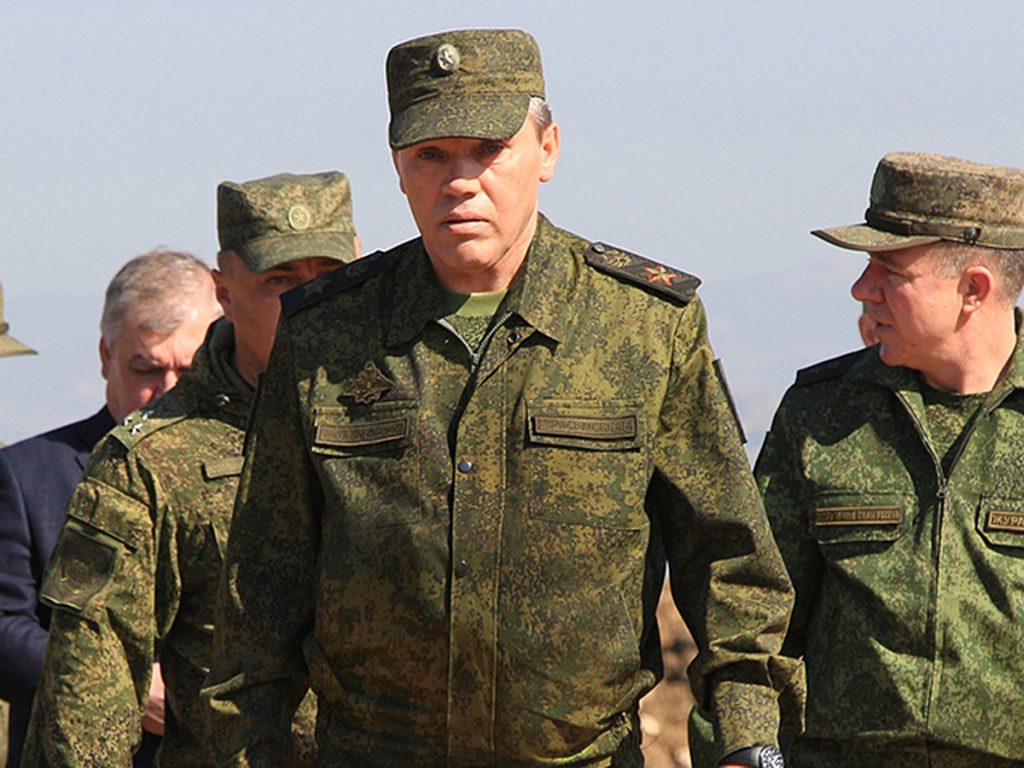
On Tuesday, 16 July, the chief of the Russian General Staff, Army General Valeriy Gerasimov, arrived in the temporarily occupied territory of Ukraine, in the zone of the so-called “SSO”. His official place of stay was not disclosed, but a number of sources said that Gerasimov visited Donetsk Region. It is also noted that the head of the Russian General Staff visited the command post of the Vostok grouping of troops, where he heard a report on the progress of military operations.
It is also reported that during his visit Gerasimov presented awards to distinguished servicemen and inspected robotic combat systems used in assault operations.
Totals/Predictions:
Russia is preparing for the fact that the AFU may launch a counter-offensive in the near future. It is important for Gerasimov to monitor the state of the Russian armed forces, to inspect the army – especially since the system of additions and theft in the army under Sergei Shoigu reached catastrophic proportions, and now both the Defence Ministry and the General Staff are trying to restore order.
It is important for Gerasimov to hold a meeting with commanders to determine possible areas of attack by the AFU and to assess the quality of fortifications and equipment. The Russian Armed Forces General Staff is also planning the possibility of transferring fresh forces to the combat zone – for this purpose, it is necessary to understand what the number of troops should be and in what direction.
- Visit of the delegation of the Ministry of Defence of the Russian Federation to North Korea
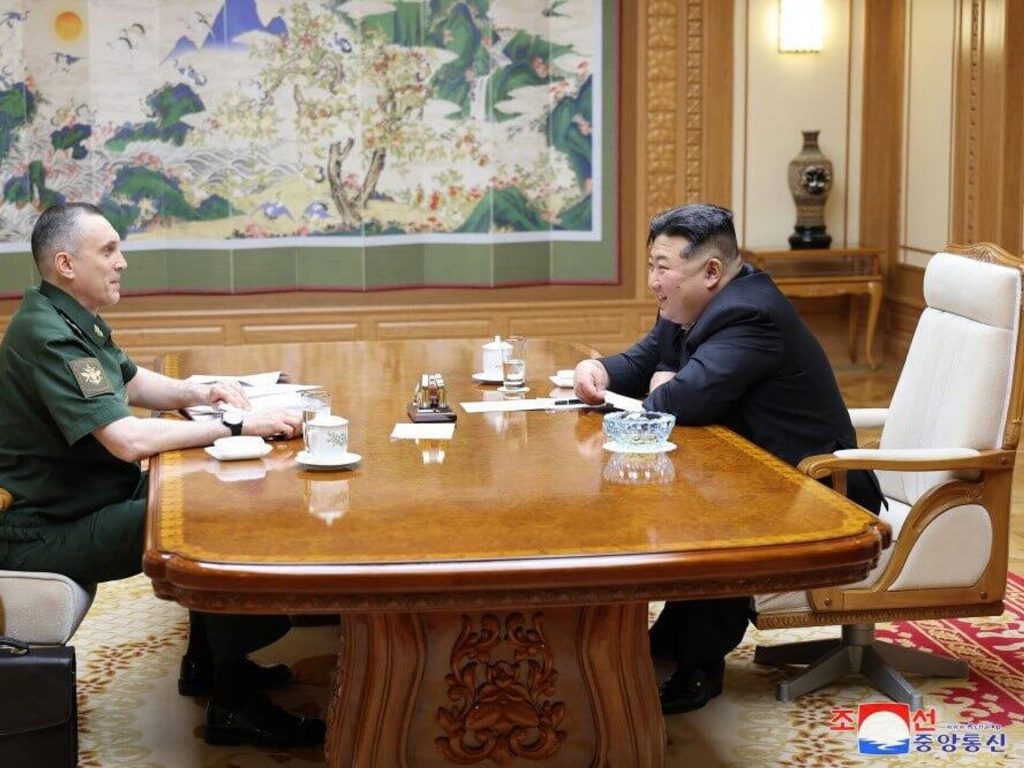
On Friday, July 19, a delegation of the Russian Defence Ministry arrived in Pyongyang to hold regular talks with the DPRK leadership. It is noted that the delegation was headed by Deputy Head of the Russian Defence Ministry Alexei Krivoruchko. It is also known that the Russian military was personally received by the DPRK leader Kim Jong-un. The meeting took place at the headquarters of the Central Committee of the Workers’ Party of Korea.
According to an official statement by North Korea’s state-run news agency CTAK, during a conversation with Russian military personnel, the DPRK leader emphasised the importance of the Russian-Korean summit held in Pyongyang in June. He noted that the armies of the two countries are linked by long, historical ties, and today they should firmly unite to develop Russian-Korean relations, which play an important role in defence of regional and global peace and international justice. Kim Jong-un also expressed strong and unabashed support for the Kremlin’s ongoing so-called SWO. Against Ukraine.
Later, Putin’s spokesman Dmitry Peskov, commenting on the purpose of the visit said that the trip of the MoD representatives to the DPRK is part of the work that is being done, among other things, as part of the implementation of those agreements that were reached during Vladimir Putin’s recent official visit to Pyongyang.
Totals/Predictions:
Deputy Defence Minister Alexei Krivoruchko, a close relative of Rostec CEO Sergei Chemezov, was predicted by many experts to resign as early as April 2024 – when a high-profile corruption scandal involving his close friend, Deputy Minister Timur Ivanov, broke.
Krivoruchko is considered one of the richest officials in the security agencies. He was closely connected not only with Chemezov, but also once with the Izmailovo organised crime group, as well as with the group of Andrei Bokarev and Iskandar Makhmudov. But in May 2024, it turned out that Krivoruchko was one of the few who remained in his post after Shoigu’s resignation.
He has met personally with Putin several times recently. And the fact that Krivoruchko has been appointed to oversee the Korean area is telling: in the Ministry, he is responsible for supplying the army with ammunition and ammunition. The agreements between Putin and Kim Jong-un on mutual military assistance between Russia and North Korea will obviously, as predicted, primarily concern the supply of Korean ammunition for the needs of the Russian army.

